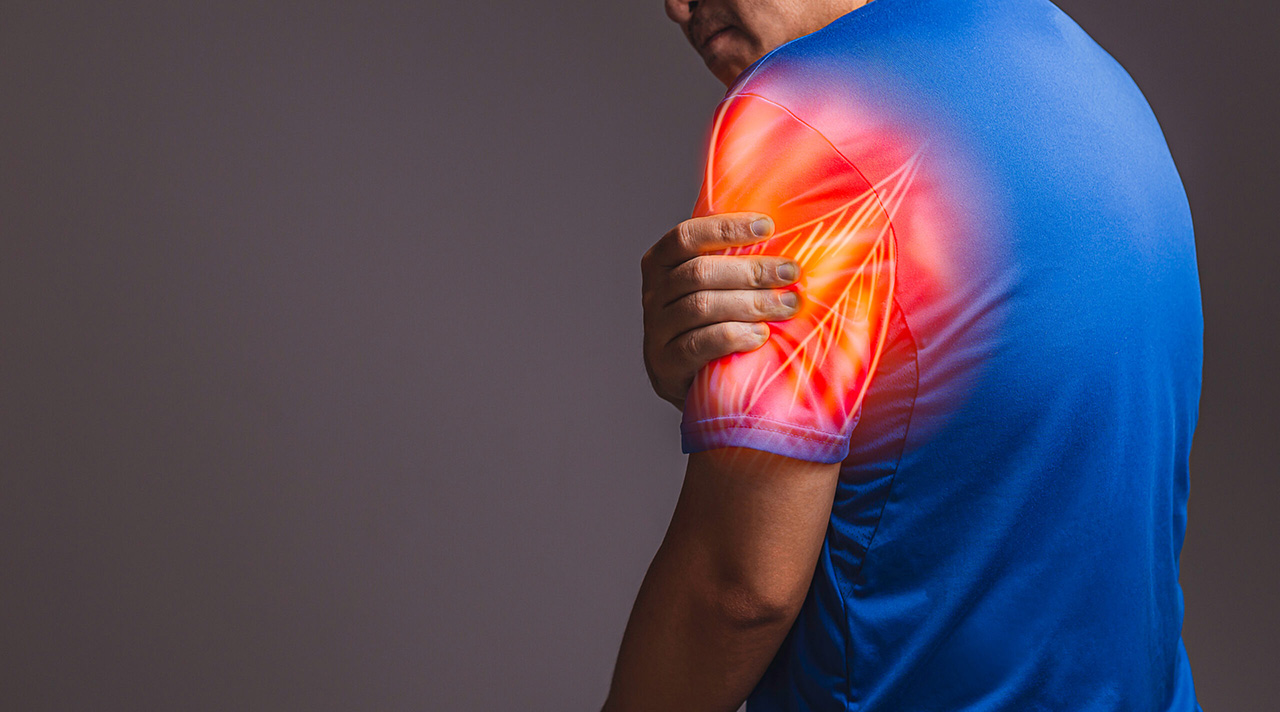
多发性肌炎是一种罕见的慢性肌肉疾病。它属于一类更广泛的炎症性肌肉疾病,即特发性炎症性肌病 (IIM),该疾病还包括皮肌炎、包涵体肌炎等。
多发性肌炎最常见于30至50岁的成年人,女性发病率高于男性。其特征是肌肉无力和炎症。多发性肌炎通常影响靠近躯干的肌肉,但随着时间的推移,它会逐渐发展并影响其他肌肉,导致简单的身体运动困难。
多发性肌炎的病因是什么?
多发性肌炎的确切病因尚不清楚,但据信它是一种自身免疫性疾病,免疫系统会攻击肌肉组织。遗传易感性可能会增加患病风险。
获得 IVIG 共同支付援助
IVIG 财务援助多发性肌炎的危险因素有哪些?
风险因素 与多发性肌炎相关的疾病包括:
- 自身免疫性疾病,如类风湿性关节炎、干燥综合征、系统性红斑狼疮和硬皮病
- 艾滋病毒和艾滋病
多发性肌炎的体征和症状是什么?
多发性肌炎最常见的症状是炎症引起的肌肉无力。这种症状可能持续数周或数月,身体两侧的肌肉组织都会受到同等程度的影响。多发性肌炎通常影响靠近躯干的肌肉,例如肩部、上臂、颈部、上背部、大腿和臀部。患有这种疾病的人可能难以举起物体、上楼梯、将手臂举过头顶或从椅子上起身。在严重的多发性肌炎病例中,如果食道和咽部肌肉组织受到影响,患者可能会出现吞咽困难,但这种情况并不常见。肩胛带和骨盆肌肉无力可能导致患者需要坐轮椅或卧床不起。其他症状包括:
- 肌肉疼痛和僵硬
- 疲劳
- 发烧
- 关节僵硬和疼痛
- 体重减轻
- 雷诺氏现象,一种由于血液流动不畅而导致手指或脚趾变得非常冷且变色的疾病
诊断
如果您的医生怀疑患有多发性肌炎,可能会建议进行以下一项或多项检查:
- 血液检查:血液检查可以显示体内肌肉酶水平是否升高,这提示肌肉受损。血液检查还可以检测与多发性肌炎不同症状相关的自身抗体。这有助于确定最佳药物和治疗方法。
- 肌电图: 肌电图(EMG) 这项检查是为了检查患侧肌肉是否存在电活动异常。方法是将一根细针电极穿过皮肤插入患侧肌肉。然后在肌肉放松或收紧时测量电活动,电活动模式的变化可以确诊多发性肌炎。通过测试身体各个部位的肌肉,可以测量疾病在体内的分布情况。
- MRI: 磁共振成像 (MRI) 可提供肌肉的横截面图像,以评估与多发性肌炎相关的肌肉炎症。MRI 可用于评估大面积肌肉炎症。
- 肌肉活检: 通过手术从身体中取出一小块肌肉组织样本进行实验室分析,以检查是否存在异常,例如损伤、炎症以及某些酶和蛋白质的缺乏。
治疗信息
获得 IVIG 事先授权多发性肌炎能治愈吗?
虽然多发性肌炎尚无治愈方法,但治疗与多发性肌炎相关的疾病可以改善肌肉力量和功能。越早开始治疗,越能有效地预防症状恶化并减少并发症。
正如任何健康状况一样,没有一种治疗方法能够适用于所有情况。医生会根据您的症状以及身体对症状的反应,推荐治疗和用药策略。
药物
多发性肌炎是一种慢性疾病,但有一些方法可以帮助控制它。治疗多发性肌炎最常用的药物包括:
- 皮质类固醇:泼尼松等药物可以有效控制多发性肌炎的症状。然而,长期服用这些药物可能会引起一些严重的副作用。因此,医生可能会逐渐减少剂量,直至达到较低但仍然有效的水平。
- 皮质类固醇减量剂:这些药物通常与皮质类固醇合用,以减少皮质类固醇的剂量和潜在的副作用。多发性肌炎最常用的药物是甲氨蝶呤和硫唑嘌呤。其他药物包括他克莫司、环孢素和霉酚酸酯。
- 利妥昔单抗: 尽管这种药物更常用于治疗类风湿性关节炎,但当初始治疗不足以控制多发性肌炎症状时可以使用这种药物。
静脉注射免疫球蛋白(IVIG)治疗
多发性肌炎被认为是一种自身免疫性疾病,可用上述药物治疗。然而,许多对此类治疗有反应的患者最初会对这些疗法产生耐药性,或者长期使用这些药物可能会引起严重的副作用。
对于这样的患者, 静脉注射免疫球蛋白(IVIG)治疗 可以考虑。 研究 研究表明,静脉注射免疫球蛋白(IVIG)已被成功用于治疗多发性肌炎。IVIG通过提高人体免疫球蛋白水平来减轻或控制自身免疫性疾病的炎症影响。需要注意的是,IVIG并非一线治疗方案,通常用于难治性或重症病例,尤其是在伴有吞咽困难的情况下。
免疫球蛋白 源自人体血浆,其中含有可抑制多发性肌炎有害抗体的抗体。IVIG 通过静脉注射(通过手臂静脉),剂量根据患者体重而定。
标准剂量为2克/公斤,每月分2至5天连续服用。IVIG疗程通常为3至6个月,并根据患者对治疗的反应逐渐减少剂量。
获得 IVIG 共同支付援助
IVIG 财务援助多发性肌炎的并发症有哪些?
如果多发性肌炎不治疗,可能会导致严重的并发症。可能的并发症包括:
- 吞咽困难:当食道和咽喉肌肉受到影响时,人可能会出现吞咽困难,从而导致营养不良和体重减轻。
- 吸入性肺炎:当一个人吞咽困难时,就更容易将食物或液体吸入肺部,从而导致肺炎。
- 呼吸问题: 当胸部肌肉受到影响时,人可能会出现呼吸急促或呼吸系统衰竭。
预后
多发性肌炎患者的长期预后取决于病情的严重程度。大多数患者对治疗有反应,肌肉力量会有所恢复。但在某些情况下,虚弱症状可能持续存在,症状也可能复发。即使患者已完全康复,仍有复发的风险。多发性肌炎很少危及生命。但是,如果患者对治疗反应不佳,则可能导致残疾。多发性肌炎还可能增加患骨质疏松症或癌症的风险。通常建议新诊断的患者进行适合其年龄的癌症筛查。
多发性肌炎患者的预期寿命是多少?
虽然目前尚无治愈该病的方法,但可以通过早期治疗多发性肌炎来控制肌肉损伤。 根据默克手册多发性肌炎成人患者的5年生存率为75%。然而,值得注意的是,该生存率是一个估计值,很大程度上取决于年龄、病情严重程度和并发的恶性肿瘤。多发性肌炎患者的死亡可能源于严重且进行性的肌肉无力、营养不良、吞咽困难、吸入性肺炎或呼吸衰竭,并发肺部感染。
咨询 IVIG 专家
最佳 IVIG 家庭输液 | 获取 IVIG 治疗协助结论
多发性肌炎是一种罕见的慢性肌肉疾病,其特征是肌肉发炎和无力。如果不及时治疗,炎症和无力症状可能会扩散到身体其他部位。如果您出现多发性肌炎症状,请尽快就医,以防止病情发展成严重疾病。
虽然多发性肌炎尚无治愈方法,但治疗可以帮助提高肌肉力量。早期诊断和治疗可以有效消除症状并预防任何并发症。













